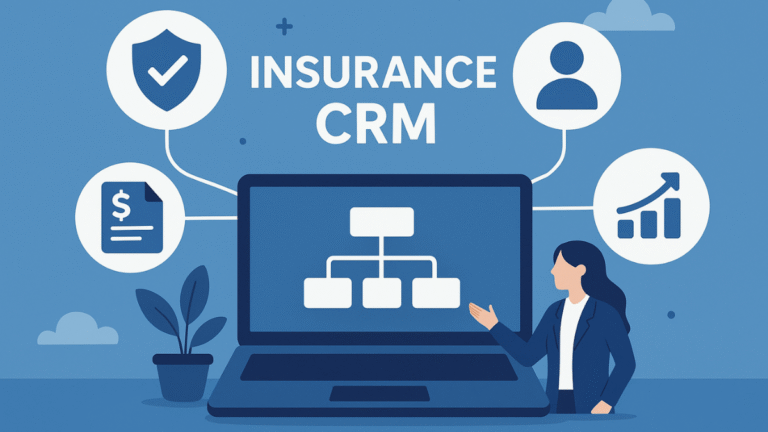Customer Relationship Management (CRM) is a powerful tool used by businesses to streamline customer interactions, improve service, and boost sales. In the insurance industry, an Insurance CRM is specifically tailored to meet the unique demands of policy management, lead tracking, client communication, and claims handling. It’s not just a piece of software—it’s a comprehensive strategy that ensures customer satisfaction and operational efficiency.
This article dives deep into the concept of Insurance CRM, how it works, its features, benefits, and why it’s essential in today’s fast-paced insurance world.
Understanding the Basics of Insurance CRM
What Does CRM Mean in Insurance?
Insurance CRM refers to a system that helps insurance companies manage interactions with potential and existing customers. It integrates tools and functionalities that allow agents and brokers to track customer data, automate communications, monitor policy renewals, and analyze sales performance.
Why CRM Is Essential for the Insurance Industry
The insurance sector relies heavily on long-term relationships and trust. Traditional methods like spreadsheets, paper-based files, or basic software tools are no longer efficient in managing complex customer portfolios. A robust CRM system enables:
- Personalized customer service
- Centralized client data
- Automated follow-ups and reminders
- Real-time analytics for better decision-making
Key Features of an Insurance CRM
1. Lead Management
Insurance CRMs help in capturing leads from various channels such as websites, emails, and social media. These leads can be automatically assigned to agents based on region or product specialization.
2. Policy Management
An advanced CRM maintains a record of active and expired policies, enabling agents to keep track of renewal dates, lapses, and changes in policy status.
3. Communication Automation
From email marketing to automated SMS reminders and call scheduling, Insurance CRMs ensure that clients are consistently engaged without manual effort.
4. Claims Tracking
Efficient CRM systems integrate with claims management software to monitor claim status, customer queries, and document submissions, improving customer satisfaction.
5. Document Storage

All client-related documents like KYC, policy papers, and communication history are securely stored in one centralized location for easy access.
6. Workflow Automation
You can automate repetitive tasks like sending follow-up messages, notifying clients of policy renewals, and escalating unresolved issues.
7. Reporting and Analytics
Insurance CRM offers dashboards to analyze team performance, conversion rates, sales cycles, and client behavior, which help businesses make data-driven decisions.
How Insurance CRM Benefits Agents, Brokers, and Companies
For Insurance Agents
- Reduces time spent on administrative tasks
- Improves follow-up efficiency
- Offers mobile access for field sales
- Helps focus on high-value leads
For Insurance Brokers
- Enables better coordination among agents
- Offers complete visibility into client history
- Helps meet compliance requirements
For Insurance Companies
- Improves overall operational efficiency
- Enhances client retention through proactive communication
- Supports scalability and better data control
- Enables strategic planning with real-time insights
Types of Insurance CRMs
On-Premise CRM
This type is hosted on the company’s servers. It offers complete control over data but requires significant upfront investment and IT support.
Cloud-Based CRM
Also known as SaaS CRM, this type is hosted on the cloud and offers easy scalability, regular updates, and accessibility from any device.
Industry-Specific CRM
Some CRM systems are custom-built for insurance needs and come with preloaded features like policy tracking, premium reminders, and compliance monitoring.
Challenges Solved by Insurance CRM
Disorganized Data
Manual records are prone to errors and duplication. Insurance CRM eliminates these issues by maintaining a clean, centralized database.
Missed Follow-ups
Automated reminders ensure that agents never miss an important client interaction or renewal date.
Limited Customer Insights
CRMs analyze customer interactions and provide detailed insights into behavior, preferences, and purchasing patterns.
Poor Claim Management
CRMs integrate with claim systems to give clients real-time updates and resolve their concerns faster.
Integrations That Make CRM More Powerful
A modern Insurance CRM can integrate with:
- Email platforms (Gmail, Outlook)
- Telephony systems for call tracking
- Payment gateways for premium collection
- Social media for lead generation
- Marketing automation tools for campaign management
- Document signing platforms like DocuSign
How to Choose the Right Insurance CRM
Consider Your Business Size
Small agencies might need a simplified, budget-friendly CRM, while large enterprises require advanced features and integrations.
Focus on Customization
Choose a CRM that lets you customize workflows, dashboards, and templates according to your business process.
Evaluate Customer Support

Reliable customer support ensures that you receive prompt assistance whenever needed.
Check Integration Capabilities
Ensure that the CRM integrates well with your existing tools and systems.
Free Trial and Demo
Always test the platform with a free trial or demo before making a long-term commitment.
The Future of Insurance CRM
With the rise of AI and Machine Learning, the next generation of Insurance CRM platforms will offer:
- Predictive analytics for churn prevention
- Chatbots for automated client interaction
- Voice assistants for hands-free usage
- Smart dashboards for instant decision-making
These advancements will redefine how insurance professionals manage relationships and grow their business.
Common Misconceptions About Insurance CRM
“It’s Just for Big Companies.”
In reality, even individual agents and small brokers can benefit immensely from using CRM tools tailored to their scale.
“Too Expensive to Implement.”
Many CRMs now offer affordable plans, and the ROI is usually far greater than the cost.
“It’s Just a Contact Management Tool.”
CRM is much more. It handles leads, renewals, claims, analytics, and personalized communications all in one place.
Real-Life Use Cases of Insurance CRM
Case Study 1: Increasing Client Retention
An insurance agency used a CRM to send automated renewal alerts and personalized policy upgrade suggestions. Result: 35% increase in client retention.
Case Study 2: Streamlining Claim Processing
A mid-sized insurer integrated CRM with their claims management tool. This enabled faster claim resolution and improved customer satisfaction scores by 40%.
Case Study 3: Boosting Sales with Automation
An agent deployed email automation via CRM, leading to 20% higher conversion from cold leads.
Also Read: What Is Parametric Insurance?
Conclusion
In today’s digital landscape, an Insurance CRM is no longer a luxury—it’s a necessity. Whether you’re an agent, broker, or large insurance company, CRM can transform your workflow, increase customer satisfaction, and improve profitability. From managing leads to ensuring timely renewals and seamless communication, a CRM provides the infrastructure that every modern insurance business needs to thrive.
By investing in a suitable Insurance CRM, you not only enhance operational efficiency but also strengthen your relationships with clients—ensuring long-term growth and success in a competitive market.
FAQs
1. What does CRM stand for in insurance?
CRM stands for Customer Relationship Management, a system that helps insurance professionals manage interactions with customers and streamline business processes.
2. Is Insurance CRM useful for small agencies?
Yes, many affordable and scalable CRM solutions are tailored specifically for small to medium-sized insurance agencies.
3. Can I use CRM to track policy renewals?
Absolutely. Most Insurance CRMs offer automated renewal reminders and scheduling tools to prevent missed renewals.
4. Are Insurance CRMs safe for storing customer data?
Yes, reputable CRMs provide bank-grade security with encryption, role-based access, and compliance with privacy regulations like GDPR.
5. How do I know which CRM is best for my insurance business?
Consider your budget, required features, team size, and integration needs. Always test the CRM with a trial before finalizing.

